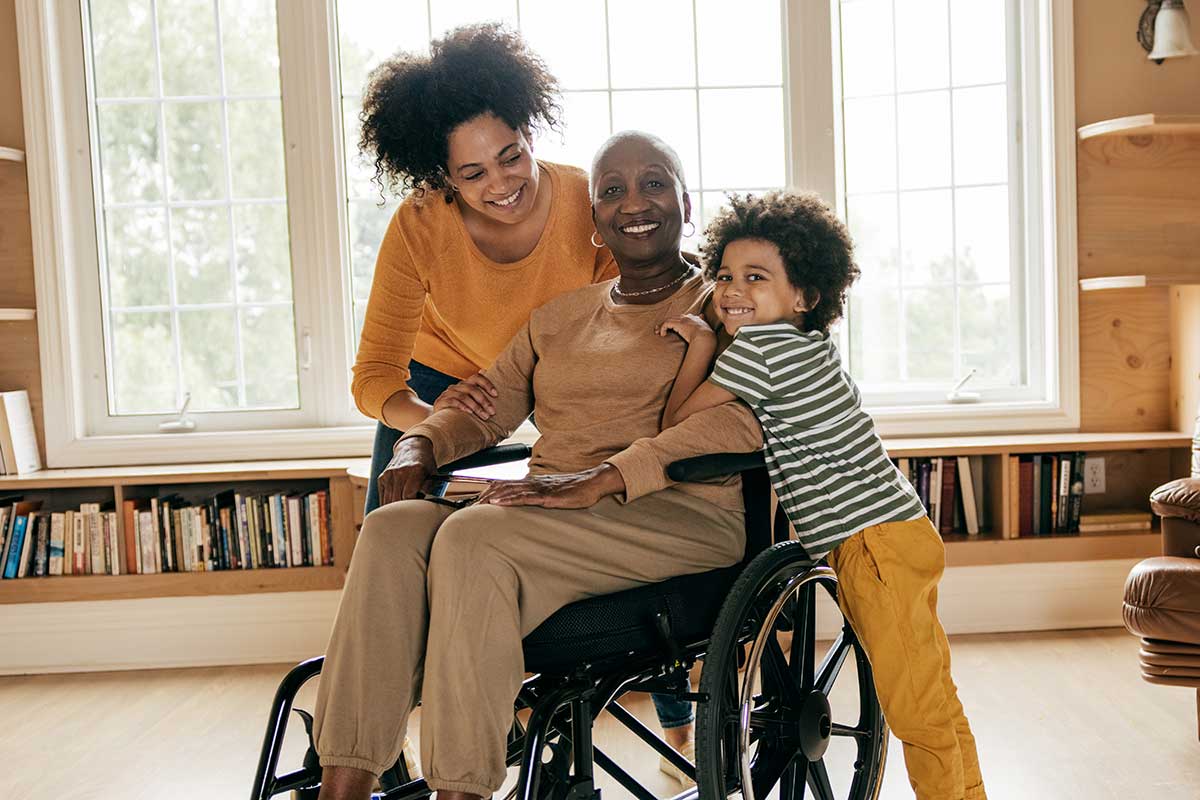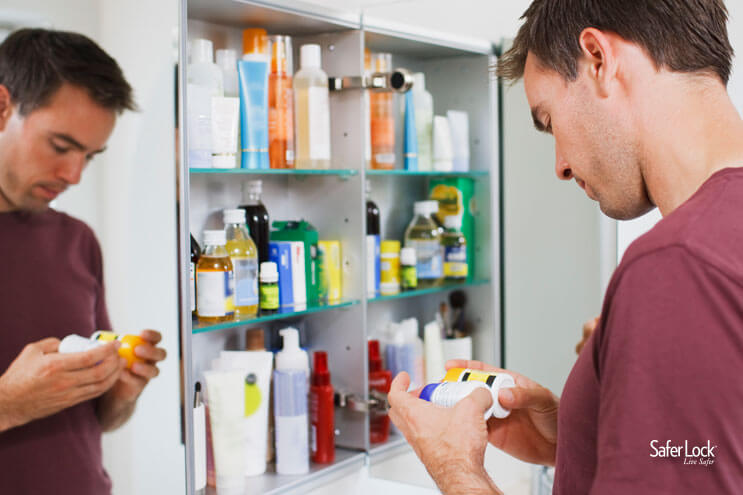For parents with young children, the holiday season brings visitors, decorations, new routines, and constant distractions, creating conditions where household hazards escalate into major emergencies.
Keeping your young children safe during the holiday season may sound like an overwhelming task. Luckily, you can take a few preventive steps to protect your little ones, so you can spend the season making memories instead of worrying about accidents at home.
This is your guide to essential safety tips and products that can help protect your young children against accidents, injuries, illnesses, and poisonings during the holidays.
Keep Kids Away from Grandma’s Medications
During the holidays, homes often contain more medications, supplements, and personal items from visiting relatives. Children find pills and brightly colored bottles appealing, and standard “child-resistant” packaging is often easily opened by children as young as a few years of age.
An estimated 60,000 children under the age of five visit an emergency department for unsupervised medication exposures, otherwise known as medication poisoning. Most visits (70%) involved children aged 1-2 years, and half of all visits involved a prescription medication.
If you have relatives visiting over the holidays, it’s critical to know that grandparents can increase the risk of child medication poisoning.
A study conducted at the Long Island Poison Center found that about 2 of every 10 medicine poisonings in children involved grandparents' medicines. Most of these poisonings, caused by what the study participants called the “Granny Syndrome,” involved grandparents' medicines that had been left on a table or countertop, on low shelves, or in grandmothers' purses.
How to Reduce the Risk
Use a medication lock box or locking Rx bag to secure prescription medications, OTC meds, and supplements. Keep an extra lock box or bag handy for visiting family members to use while they are guests in your home. Keep other child poisoning risks, such as household cleaning chemicals and personal care items, secured in locked or latched cabinets.
Medication safety isn’t just critical for protecting young children. Securing powerful prescriptions can also keep teens and older children from accessing medicines, as well.
Try: The Rx Locking Bag by RxGuardian. A soft-sided locking pouch featuring a 3-digit combination lock that’s large enough to fit a PillMinder and multiple prescription medicines. It comes with a customizable label so you can keep track of medicines for multiple guests.
Prioritize Prevention of Button Battery Ingestion
Holiday décor, remote controls, toys, and many other household electronic items are powered by button batteries that can be dangerous if swallowed. According to the National Capital Poison Center, batteries can burn through a child’s esophagus in just 2 hours, leading to surgery, months with feeding and breathing tubes, and even death.
Safe Kids reports that more than 2,800 kids are treated in emergency rooms every year after swallowing button batteries; that’s one child every three hours.
Even disposing of button batteries can pose a risk to young children; nearly one of every three (29.8%) button battery injuries involved batteries that were discarded or sitting out. Tape button batteries before disposal can help reduce this risk.
If you think your child has swallowed a button battery, call the National Battery Ingestion Hotline at 1-800-498-8666 immediately.
How to Reduce the Risk
- Store all batteries, including button batteries, in a secure combination lock box, safe, or other locked container.
- Double-check battery compartments on remotes and small electronics to ensure they latch and stay closed.
- Don’t encourage small children to “help” replace batteries in toys
- Wrap tape around button batteries before disposing of them
Latch Cabinets to Prevent Pediatric Poisoning
Household cleaning supplies, including laundry packets and bleach, contribute to the risks of pediatric poisoning deaths and emergency department-treated injuries for children under the age of five.
In addition to medications, household cleaning substances, including bleach, cleaners, cosmetics, personal care products, insect sprays, paint solvents, and lighter fluids, are some of the most frequent causes of unintentional poisoning among children.
In addition to keeping medications secure in lock boxes or locking medication bags, all of these products, from medications to household cleaning products, can be kept out of the hands of small children with the help of cabinet, drawer, and door locks.
How to Reduce the Risk
The U.S. Consumer Product Safety Commission (CPSC) recommends these safety tips to prevent unintentional pediatric poisoning.
- Store laundry packets in their original containers and out of a child’s sight and reach.
- Do not let children handle laundry detergent packets.
- Keep chemicals and cleaning supplies safely stored in a locked cabinet or box and out of the reach of children.
- Keep household chemicals in their original child-resistant containers.
- Keep medications safely stored in a locked box or cabinet and out of reach of children.
Try: Benny Bradley’s Invisible Baby Proofing Cabinet Latch Locks (10 pack). Compatible with a variety of cabinet styles, invisible damage-free design that can handle up to 20lbs of pull tension, with one-press easy adult access.
Go Flameless to Prevent Holiday Fires
Holiday decorating kicks off the winter fire season. U.S. fire departments respond to an average of 832 home fires each year involving holiday decorations, and 145 annual Christmas tree fires. Candle fires peak in December and January each year.
How to Reduce the Risk
Prevent holiday fires with these safety tips from the National Fire Protection Association (NFPA):
- Choose holiday decorations that are flame-resistant or flame-retardant
- Keep candles away from decorations and flammable objects
- Choose flameless candles as an alternative
- Replace any string of lights with worn or broken cords or loose bulb connections
- Hang holiday lights with clips, not nails, to avoid damaging electrical cords
- Place Christmas trees at least 3 feet away from heat sources, such as fireplaces, radiators, heat vents, candles, or lamps
- Add water to tree stands daily
- Decorate with indoor lights
- Never use candles to decorate a tree
- Always turn off Christmas tree lights before going to bed
Try: Luminara flameless candles. From collections of holiday and Christmas flameless candles to LED flameless candles that can be used all long for ambiance without the fire risk.
Avoid Dangerous Driving During the Holidays
Unfortunately, the holiday season brings an increase in traffic fatalities. Thanksgiving, Christmas, and New Year’s are among the most dangerous times of year to be on the road, with the Thanksgiving period, which begins the Wednesday before the holiday and stretches until the Sunday after, responsible for the most traffic fatalities.
Impaired and distracted driving both play a major role in traffic accidents and fatalities during the holiday season.
How to Reduce the Risk
Safe Kids suggests the following additional safety tips to keep kids safe on the road:
- Buckle up every ride, every time, whether it’s the long trip to visit family or around the block to the mall.
- Check your child’s car seat or booster before holiday travel. Seventy-three percent of car seats are not used or installed correctly, so check it before you hit the road.
- Keep an eye out for distracted pedestrians and drivers who may not be paying attention to you, especially when backing out of parking spaces. Shopping center parking lots are busier during the holidays.
- Remind your teen driver to be extra alert during this holiday season when conditions are more challenging, even for experienced drivers.
- Be a good role model by avoiding distractions. Commit to keeping your phone down. No text message or playlist is worth the risk.
- Never drive impaired.
Stay Safe this Holiday Season
Keeping your small children safe is a priority all year long, but the holiday season can create a recipe for risks. From guests staying in your home to driving on busy holiday weekends, distractions, decorations, and more, staying focused on these safety tips and applying a few select products can make it easier for you to prevent accidents, poisoning, and injuries.
Want to learn more? Discover these Holiday Safety Tips to Prevent Accidents at Home



